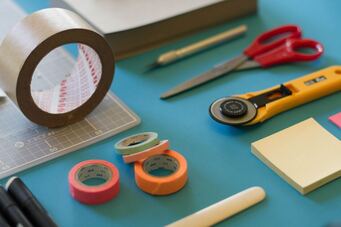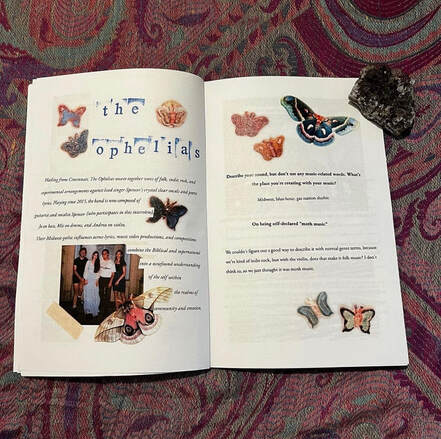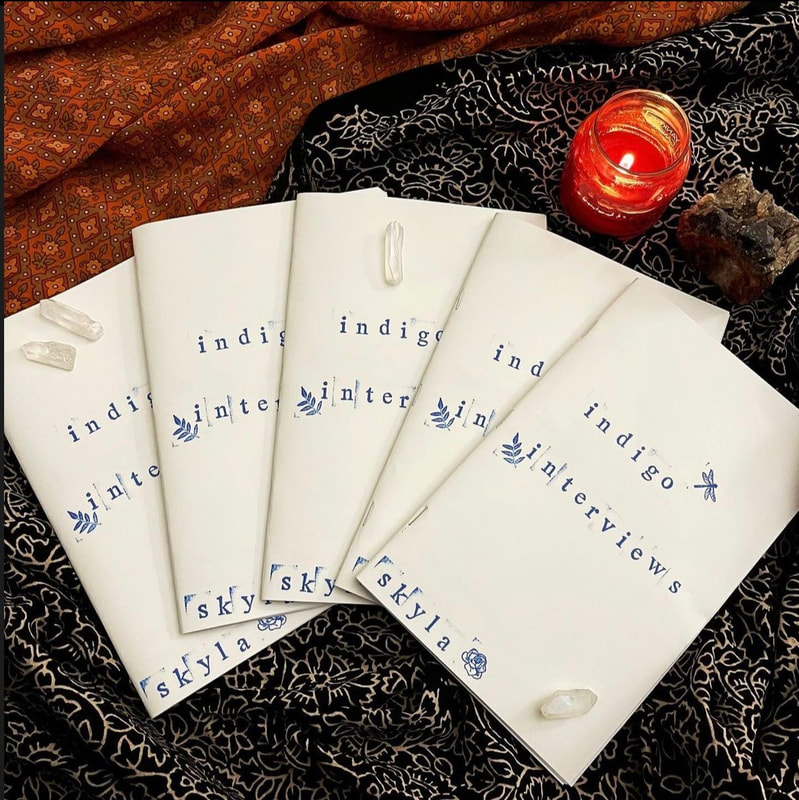|
by Skyla Everwine  Photo by Jo Szczepanska on Unsplash Photo by Jo Szczepanska on Unsplash The most punk-rock thing I did this semester was stand in line at a UPS and try not to cry. It wasn’t the basement shows or broken guitar strings, but being at UPS at 4 p.m. on a Tuesday. I had but one task: to print nine pages, double-sided and in color. And then do that until 50 more times. It was the fourth or fifth printer I had gone to in order to print the zine I was making. I had learned that commercial printers were hellish portals to untamable frustrations, and that making the project for my Self-Publishing course with Dr. Jason Luther was far more difficult than it needed to be. I had turned what could have been a single page mini-zine into 36 pages of digital and hand-collaged interviews. The DIY-ness of zines was what really drew me to them, and as someone who loves crafting and independent local art and music scenes, I saw zines as a way to bring together my different passions and become part of a newfound community. First introduced to punk music scenes around the 1970s, the DIY-driven and anti-establishment ethos of the scene paired well with the handmade productions that blossomed independently of traditional publishing. I’ve been involved with different music scenes for a couple years now—going to shows, being friends with musicians, and playing a couple open mics with friends—and so I really wanted to make a zine that focused on the local scenes in Glassboro, NJ and Philly. Having met so many amazing musicians from local shows, I wanted to highlight the Glassboro scene primarily. I called it Indigo Interviews. In theory, my plan seemed fairly simple:
My mistake in this plan was that I assumed that the printing process would be easy and cooperative. I didn’t have access to uncoated paper printing to eliminate gloss or risograph printing, so I had to rely on inkjet printers. Digitally collaging let me adjust the brightness and transparency of the images, as well as layer them to create a look similar to screen printing, which I then printed and hand-collaged to then rescan. Because inkjet printing was my only option, and I didn’t have enough color ink at my home printer, I ended up going on a daring quest to find a functional color printer within a twenty minute radius that didn’t break the bank:
Admittedly, my budgeting was awful for this project, and I actively choose to ignore how much I invested into it. Most of the budgetary issues were a result of the series of printer mishaps and unexpectedly high mailing prices.  But the troubles of the process don’t amount to much compared to the joys. As someone who is a perfectionist with a short attention span, I loved the impulsive creativity and celebrated imperfections of the zine. Holding a finished product in my hands was such a surreal feeling, because you print out poems or projects, but that doesn’t measure up to the allure of a 36-page bound booklet. And of course there is the feeling of accomplishment that comes with completing a project, but even better than that was the sense of community found throughout the process—found in other zine creators, distributors, and with the people who I interviewed. Engaging in local music and art scenes have always been really important to me and have become part of my identity in a way. Being told by musicians that I admire that they love my work is incredibly rewarding, and pushes me to want to create more. Outside of the interview zines, I have worked on mini poetry zines and even a larger chapbook project. At the root of it all, the sense of community is what makes all the struggles of the process worth it. It’s the most intersectional art form I’ve ever worked with. Creating, distributing, and trading zines have connected me with other writers, artists, musicians, and just people interested in those things. I’ve since made zines for my graffiti artist friend who lives across the country about local art here in New Jersey, and I’ve created visual representations of poetry that I’ve written. Zines give the freedom to go beyond words and utilize any medium I could think of, with an accepted charm to its imperfections. I would stand in line at UPS purgatory for days on end if it means that my little handmade ramblings are important to someone.
1 Comment
Zoey Parkinson
6/1/2023 09:36:06 am
I thoroughly enjoyed this piece. If I had not taken the time to consume this content, I would have gone through the rest of my life never knowing how much love and dedication goes into the creation of a zine. Skyla wrote this piece for anyone to enjoy and you can tell. The sentences are structured in a fun and enticing manner that kept me reading despite having never interacted with the zine community or created a zine myself. I now want to try my hand at merging one of my hobbies with this passion project and I have a newfound respect for something I may have originally overlooked. Great piece!
Reply
Leave a Reply. |
Archives
July 2024
Categories
All
|
|
Glassworks is a publication of Rowan University's Master of Arts in Writing 260 Victoria Street • Glassboro, New Jersey 08028 [email protected] |
All Content on this Site (c) 2024 Glassworks
|


 RSS Feed
RSS Feed
